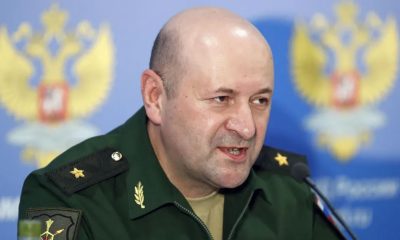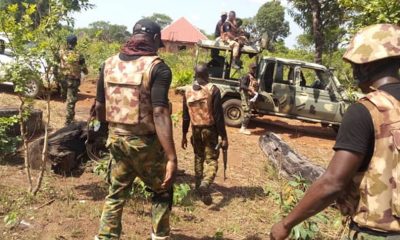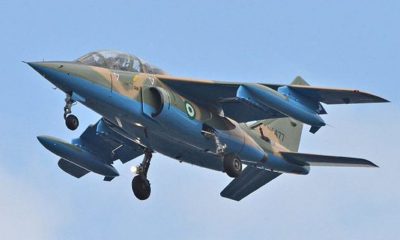International
What have been Russia’s military mistakes?

Russia has one of the largest and most powerful armed forces in the world, but that has not been apparent in its initial invasion of Ukraine. Many military analysts in the West have been surprised by its performance on the battlefield so far, with one describing it as “dismal”.
Its military advances appear to have largely stalled and some now question whether it can recover from the losses it has suffered. This week, a senior Nato military official told the BBC, “the Russians clearly have not achieved their goals and probably will not at the end of the day”. So what has gone wrong? I have spoken to senior Western military officers and intelligence officials, about the mistakes Russia has made.
Misguided assumptions
Russia’s first mistake was to underestimate the strength of resistance and the capabilities of Ukraine’s own smaller armed forces. Russia has an annual defence budget of more than $60bn, compared with Ukraine’s spending of just over $4bn.
At the same time, Russia, and many others, appear to have overestimated its own military strengths. President Putin had embarked on an ambitious modernisation programme for his military and he too may have believed his own hype.

A senior British military official said much of Russia’s investment had been spent on its vast nuclear arsenal and experimentation, that included developing new weapons such as hypersonic missiles. Russia is supposed to have built the world’s most advanced tank – the T-14 Armata. But while it has been seen on Moscow’s Victory Day Parade on Red Square, it has been missing in battle. Most of what Russia has fielded are older T-72 tanks, armoured personnel carriers, artillery and rocket launchers.
At the start of the invasion Russia had a clear advantage in the air, with the combat aircraft it had moved near the border outnumbering Ukraine’s air force by more than three to one. Most military analysts assumed the invading force would quickly gain superiority in the air, but it has not. Ukraine’s air defences are still proving effective, limiting Russia’s ability to manoeuvre.
Moscow may have also assumed its special forces would play an important role, helping deliver a quick, decisive blow.
A senior Western intelligence official told the BBC that Russia thought it could deploy lighter, spearhead units like the Spetsnatz and VDV paratroopers, “to eliminate a small number of defenders and that would be it”. But in the first few days their helicopter assault on Hostomel Airport, just outside Kyiv, was repelled, denying Russia an airbridge to bring in troops, equipment and supplies.
Instead, Russia has had to transport its supplies mostly by road. This has created traffic jams and choke points which are easy targets for Ukrainian forces to ambush. Some heavy armour has gone off road, only to get stuck in mud, reinforcing an image of an army that has become “bogged down”.
Meanwhile, Russia’s long armoured column from the north that was captured by satellites has still failed to encircle Kyiv. The most significant advances have come from the south, where it has been able to use rail lines to resupply its forces. The UK Defence Secretary, Ben Wallace, told the BBC that President Putin’s forces “have lost the momentum”.
“They’re stuck and they are slowly but surely taking significant casualties.”
Losses and low morale
Russia had amassed a force of around 190,000 troops for this invasion and most of those have already been committed to the battle. But they have already lost about 10% of that force. There are no reliable figures for the scale of either Russian or Ukrainian losses. Ukraine claims to have killed 14,000 Russian troops, though the US estimates it is probably half that number.
Western officials say there is also evidence of dwindling morale among Russian fighters, with one saying it was “very, very, low”. Another said the troops were “cold, tired and hungry” as they had already been waiting in the snow for weeks in Belarus and Russia before they were given the order to invade.
Russia has already been forced to look for more troops to make up for its losses, including moving in reserve units from as far afield as the east of the country and Armenia. Western officials believe it is also “highly likely” that foreign troops from Syria will soon join the fight, along with mercenaries from its secretive Wagner group. A senior Nato military official said this was a sign it was “scratching the bottom of the barrel”.
Supplies and logistics
Russia has struggled with the basics. There is an old military saying that amateurs talk tactics while professionals study logistics. There is evidence that Russia has not given it enough consideration. Armoured columns have run out of fuel, food and ammunition. Vehicles have broken down and been left abandoned, then towed away by Ukrainian tractors.
Western officials also believe Russia may be running low on some munitions. It has already fired between 850 and 900 long-range precision munitions, including cruise missiles, which are harder to replace than unguided weapons. US officials have warned Russia has approached China to help address some of its shortages.
In contrast, there has been a steady flow of Western-supplied weapons going into Ukraine, which has been a boost for its morale. The US has just announced it will be providing an additional $800m in defence support. As well as more anti-tank and anti-aircraft missiles, it is expected to include Switchblade, which is a small, US-developed, “kamikaze” drone that can be carried in a backpack before being launched to deliver a small explosive at targets on the ground.
Western officials still warn that President Putin could “double down with greater brutality”. They say he still has enough firepower to bombard Ukrainian cities for a “considerable period of time”.
Despite the setbacks, one intelligence official said President Putin was, “unlikely to be deterred and may instead escalate. He likely remains confident that Russia can militarily defeat Ukraine”. And while the Ukrainian forces have shown fierce resistance, that same official warned that without significant resupplies they too could “eventually be spent in terms of ammunition and numbers”. The odds may be better than when the war first started, but they still seem stacked against Ukraine.
BBC
International
Syria not threat to world, rebel leader al-Sharaa tells BBC
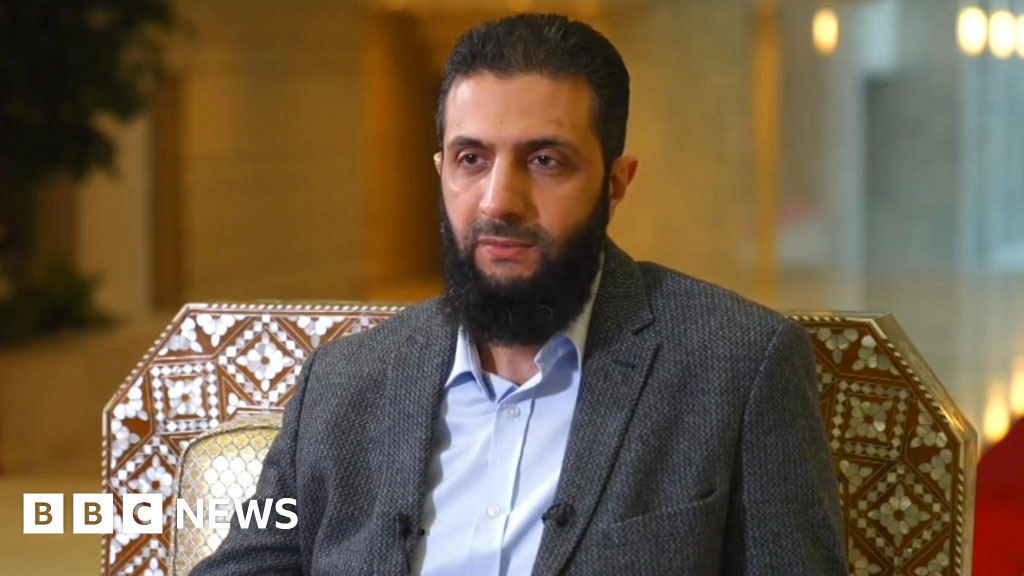
Syria not threat to world, rebel leader al-Sharaa tells BBC
The de facto leader of Syria, Ahmed al-Sharaa, has said the country is exhausted by war and is not a threat to its neighbours or to the West.
In an interview with the BBC in Damascus, he called for sanctions on Syria to be lifted.
“Now, after all that has happened, sanctions must be lifted because they were targeted at the old regime. The victim and the oppressor should not be treated in the same way,” he said.
Sharaa led the lightning offensive that toppled Bashar al-Assad’s regime less than two weeks ago. He is the leader of the Hayat Tahrir al-Sham (HTS), the dominant group in the rebel alliance, and was previously known by his nom de guerre of Abu Mohammed al-Jolani.
He said HTS should be de-listed as a terrorist organisation. It is designated as one by the UN, US, EU and UK, among many others, as it started as a splinter group of al-Qaeda, which it broke away from in 2016.
Sharaa said HTS was not a terrorist group.
They did not target civilians or civilian areas, he said. In fact, they considered themselves to be victim of the crimes of the Assad regime.
He denied that he wanted to turn Syria into a version of Afghanistan.
READ ALSO:
- Tinubu’s 2025 budget will increase poverty, worsen economy – PDP
- Real Madrid outclass Pachuca to win FIFA Intercontinental Cup
- Israel hits ports, energy sites in Yemen after missile intercepted
Sharaa said the countries were very different, with different traditions. Afghanistan was a tribal society. In Syria, he said, there was a different mindset.
He said he believed in education for women.
“We’ve had universities in Idlib for more than eight years,” Sharaa said, referring to Syria’s north-western province that has been held by rebels since 2011.
“I think the percentage of women in universities is more than 60%.”
And when asked whether the consumption of alcohol would be allowed, Sharaa said: “There are many things I just don’t have the right to talk about because they are legal issues.”
He added that there would be a “Syrian committee of legal experts to write a constitution. They will decide. And any ruler or president will have to follow the law”.
Sharaa was relaxed throughout the interview, wearing civilian clothes, and tried to offer reassurance to all those who believe his group has not broken with its extremist past.
Many Syrians do not believe him.
The actions of Syria’s new rulers in the next few months will indicate the kind of country they want Syria to be – and the way they want to rule it.
Syria not threat to world, rebel leader al-Sharaa tells BBC
BBC
International
Israel hits ports, energy sites in Yemen after missile intercepted
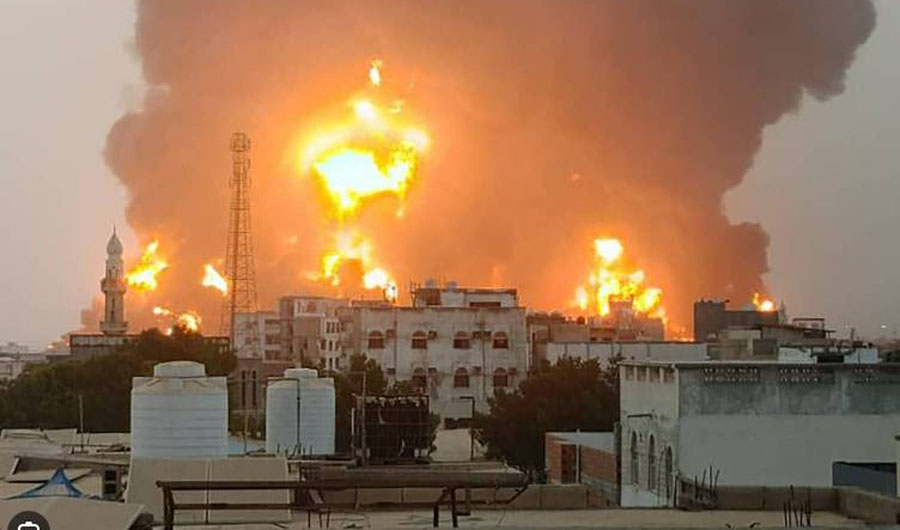
Israel hits ports, energy sites in Yemen after missile intercepted
JERUSALEM: Israel said Thursday it struck ports and energy infrastructure it alleges are used by Houthi militants, after intercepting a missile fired by the group.
Israel’s military said it “conducted precise strikes on Houthi military targets in Yemen — including ports and energy infrastructure in Sanaa, which the Houthis have been using in ways that effectively contributed to their military actions.”
The announcement came shortly after Israel said it had intercepted a missile fired from Yemen.
Al-Masira, a media channel belonging to the Houthis, said a series of “aggressive raids” were launched in the Yemeni capital of Sanaa and the port city of Hodeidah.
It reported raids that “targeted two central power plants” in Yemen’s capital Sanaa, while in Hodeidah it said “the enemy launched four aggressive raids targeting the port… and two raids targeting” an oil facility.
The strikes were the second time this week that Israel’s military has intercepted a missile from Yemen.
On Monday, the Houthis claimed a missile launch they said was aimed at “a military target of the Israeli enemy in the occupied area of Yaffa” — a reference to Israel’s Tel Aviv area.
READ ALSO:
- Gaza mediators intensify ceasefire efforts, Israeli strikes kill 20 people
- PDP expels South-East national vice chairperson over anti-party activities
- Your information on $1bn investment misleading, Dangote Refinery replies NNPCL
Also Monday, an Israeli navy missile boat intercepted a drone in the Mediterranean after it was launched from Yemen, the military said.
The Houthi militants have said they are acting in solidarity with Palestinians and pledged Monday to continue operations “until the aggression on Gaza stops and the siege is lifted.”
On December 9, a drone claimed by Houthis exploded on the top floor of a residential building in the central Israel city of Yavne, causing no casualties.
In July, a Houthi drone attack in Tel Aviv killed an Israeli civilian, prompting retaliatory strikes on the Yemeni port of Hodeidah.
The Houthis have also regularly targeted shipping in the Red Sea and the Gulf of Aden, leading to retaliatory strikes on Houthi targets by United States and sometimes British forces.
Israeli military spokesman Daniel Hagari said the group had become a “global threat,” pointing to Iran’s support for the militants.
“We will continue to act against anyone, anyone in the Middle East, that threatens the state of Israel,” he said.
Israel hits ports, energy sites in Yemen after missile intercepted
International
Gaza mediators intensify ceasefire efforts, Israeli strikes kill 20 people
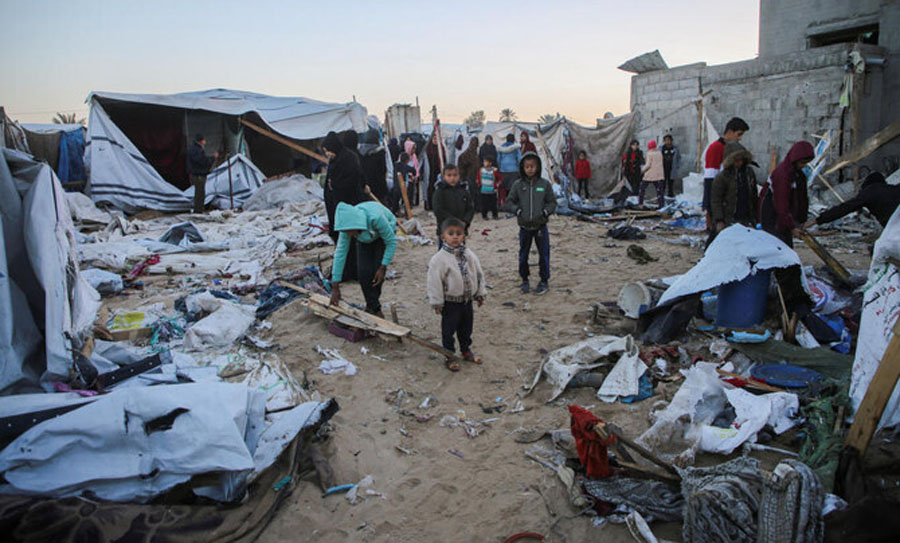
Gaza mediators intensify ceasefire efforts, Israeli strikes kill 20 people
CAIRO: The United States, joined by Arab mediators, sought on Wednesday to conclude an agreement between Israel and Hamas to halt the 14-month-old war in the Gaza Strip where medics said Israeli strikes killed at least 20 Palestinians overnight.
A Palestinian official close to the negotiations said on Wednesday that mediators had narrowed gaps on most of the agreement’s clauses. He said Israel had introduced conditions which Hamas rejected but would not elaborate.
On Tuesday, sources close to the talks in Cairo, the Egyptian capital, said an agreement could be signed in coming days on a ceasefire and a release of hostages held in Gaza in return for Palestinian prisoners held by Israel.
Medics said an Israeli airstrike killed at least 10 people in a house in the northern town of Beit Lahiya while six were killed in separate airstrikes in Gaza City, Nuseirat camp in central areas, and Rafah near the border with Egypt.
In Beit Hanoun in the northern Gaza Strip, medics said four people were killed in an airstrike on a house. There was no immediate comment from the Israeli military spokesman.
Israeli forces have operated in the towns of Beit Hanoun and Beit Lahiya as well as the nearby Jabalia camp since October, in a campaign the military said aimed to prevent Hamas militants from regrouping.
Palestinians accuse Israel of carrying out acts of “ethnic cleansing” to depopulate the northern edge of the enclave to create a buffer zone. Israel denies it.
READ ALSO:
- PDP expels South-East national vice chairperson over anti-party activities
- Your information on $1bn investment misleading, Dangote Refinery replies NNPCL
- Many die at Ibadan children’s Christmas party stampede, organisers arrested
Hamas does not disclose its casualties, and the Palestinian health ministry does not distinguish in its daily death toll between combatants and non-combatants.
On Wednesday, the Israeli military said it struck a number of Hamas militants planning an imminent attack against Israeli forces operating in Jabalia.
Later on Wednesday, Muhammad Saleh, director of Al-Awda Hospital in Jabalia, said Israeli shelling in the vicinity damaged the facility, wounding seven medics and one patient inside the hospital.
The Israeli military had no immediate comment.
In the Central Gaza camp of Bureij, Palestinian families began leaving some districts after the army posted new evacuation orders on X and in written and audio messages to mobile phones of some of the population there, citing new firing of rockets by Palestinian militants from the area.
CEASEFIRE GAINS MOMENTUM
The US administration, joined by mediators from Egypt and Qatar, has made intensive efforts in recent days to advance the talks before President Joe Biden leaves office next month.
In Jerusalem, Israeli President Isaac Herzog met Adam Boehler, US President-elect Donald Trump’s designated envoy for hostage affairs. Trump has threatened that “all hell is going to break out” if Hamas does not release its hostages by Jan. 20, the day Trump returns to the White House.
CIA Director William Burns was due in Doha on Wednesday for talks with Qatari Prime Minister Sheikh Mohammed bin Abdulrahman Al-Thani on bridging remaining gaps between Israel and Hamas, other knowledgeable sources said. The CIA declined to comment.
Israeli negotiators were in Doha on Monday looking to bridge gaps between Israel and Hamas on a deal Biden outlined in May.
There have been repeated rounds of talks over the past year, all of which have failed, with Israel insisting on retaining a military presence in Gaza and Hamas refusing to release hostages until the troops pulled out.
The war in Gaza, triggered by a Hamas-led attack on communities in southern Israel that killed some 1,200 people and saw more than 250 abducted as hostages, has sent shockwaves across the Middle East and left Israel isolated internationally.
Israel’s campaign has killed more than 45,000 Palestinians, displaced most of the 2.3 million population and reduced much of the coastal enclave to ruins.
Gaza mediators intensify ceasefire efforts, Israeli strikes kill 20 people
ARAB NEWS
-

 Railway24 hours ago
Railway24 hours agoLagos Rail Mass Transit part of FG free train ride – NRC
-

 metro2 days ago
metro2 days agoCourt stops customs from seizing imported rice in open market
-

 metro6 hours ago
metro6 hours agoWhy we displayed ‘Jesus Christ is not God’ banner at Lekki mosque -Imam
-

 metro2 days ago
metro2 days agoIbadan stampede: Tinubu orders probe as death toll hits 40
-

 metro1 day ago
metro1 day agoIbadan stampede: Ooni reacts after arrest of ex-wife
-

 metro2 days ago
metro2 days agoAfe Babalola: Court grants Dele Farotimi bail, barred from media interviews
-

 metro1 day ago
metro1 day agoNIMC warns against extortion, reaffirms free NIN enrollment
-

 News2 days ago
News2 days agoAdebayo Ogunlesi, 2 other Nigerians make Forbes 50 wealthiest Black Americans list 2024

